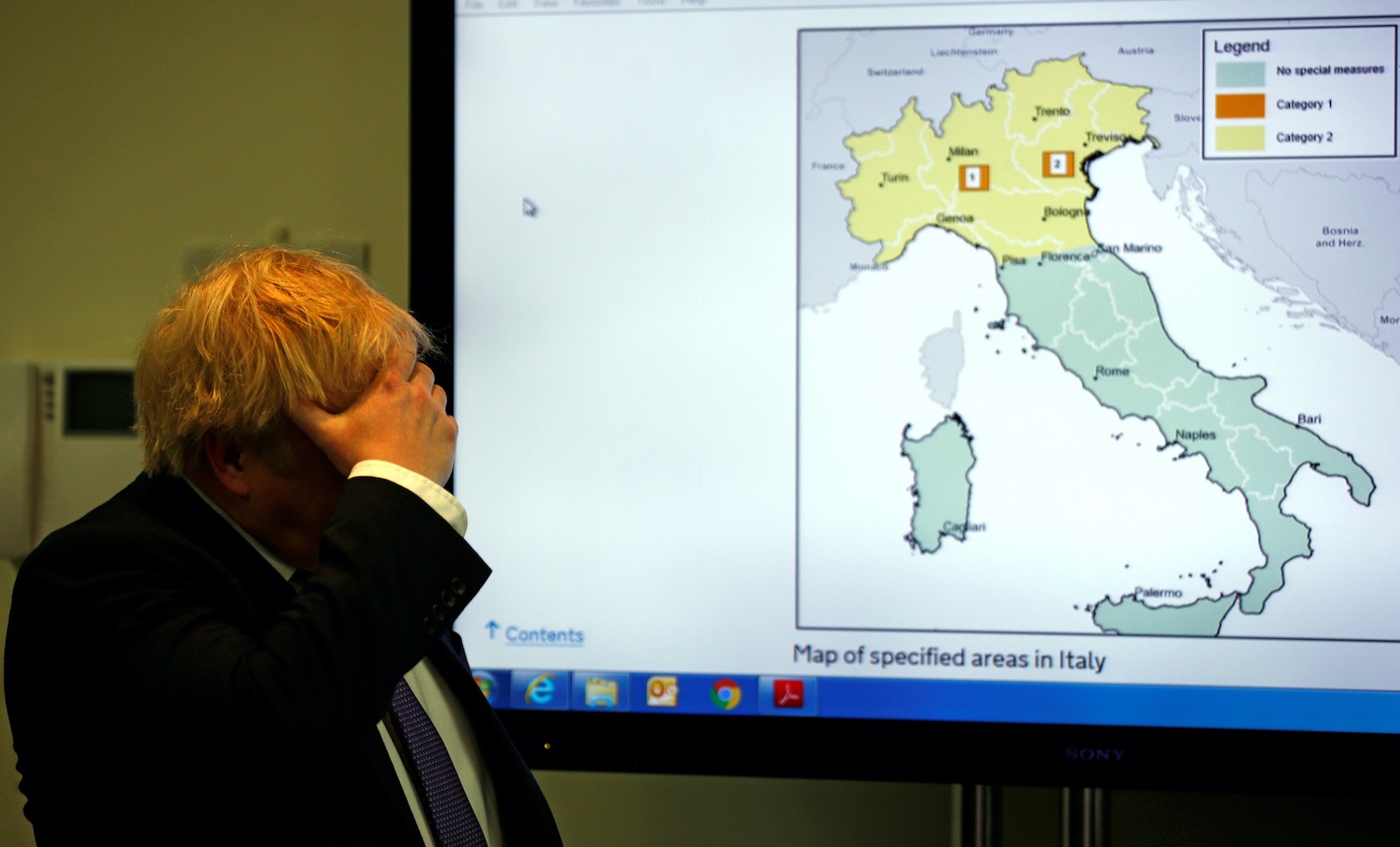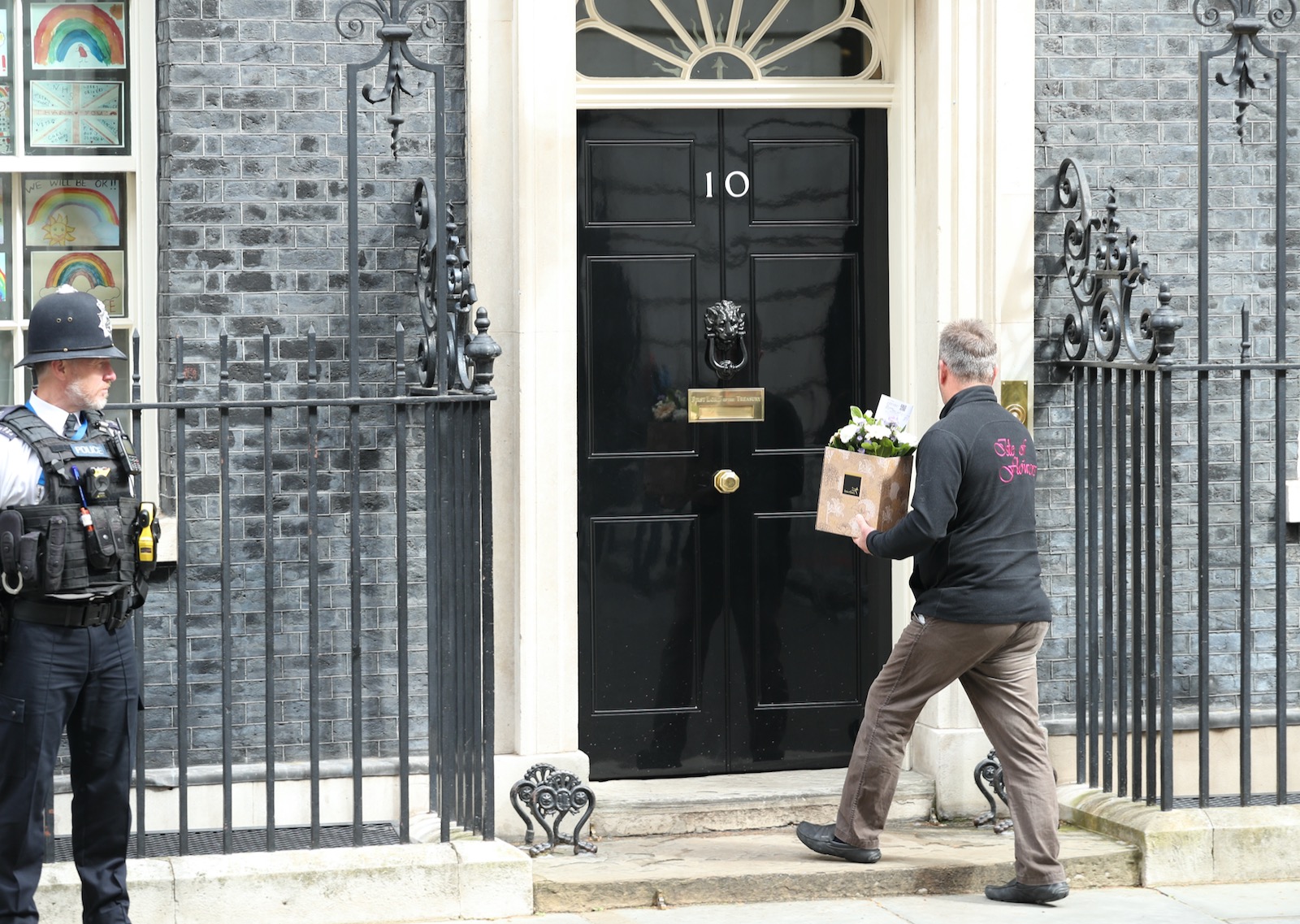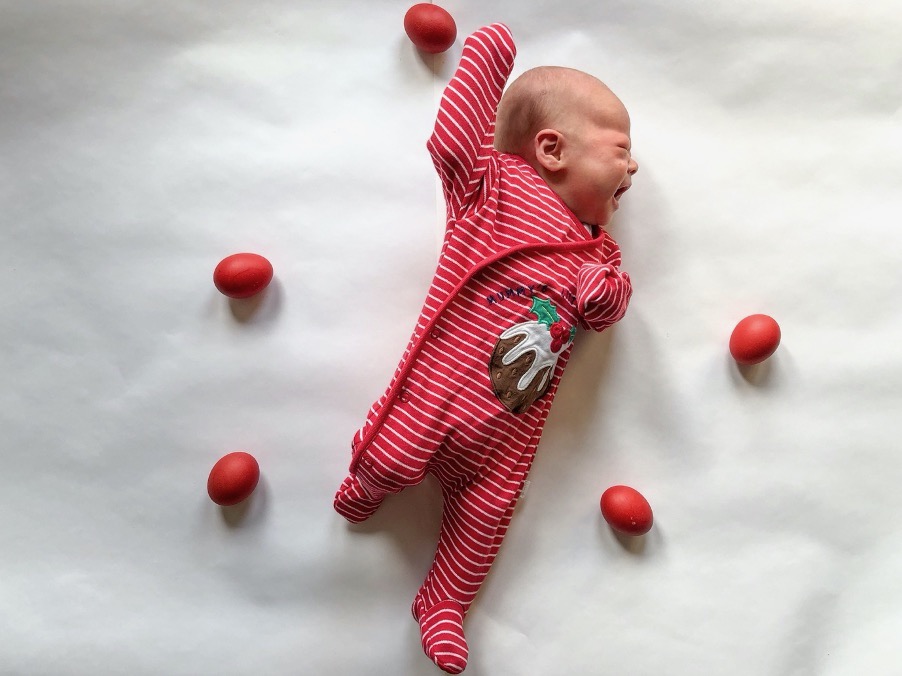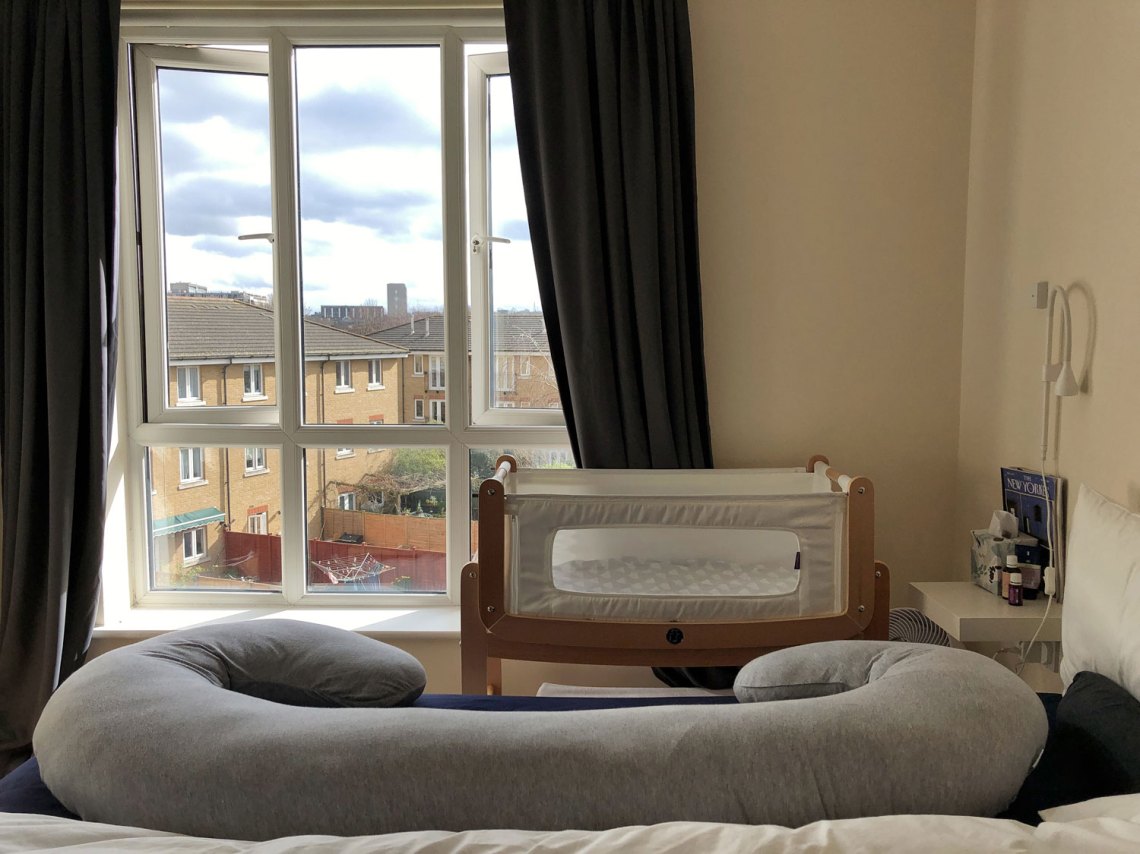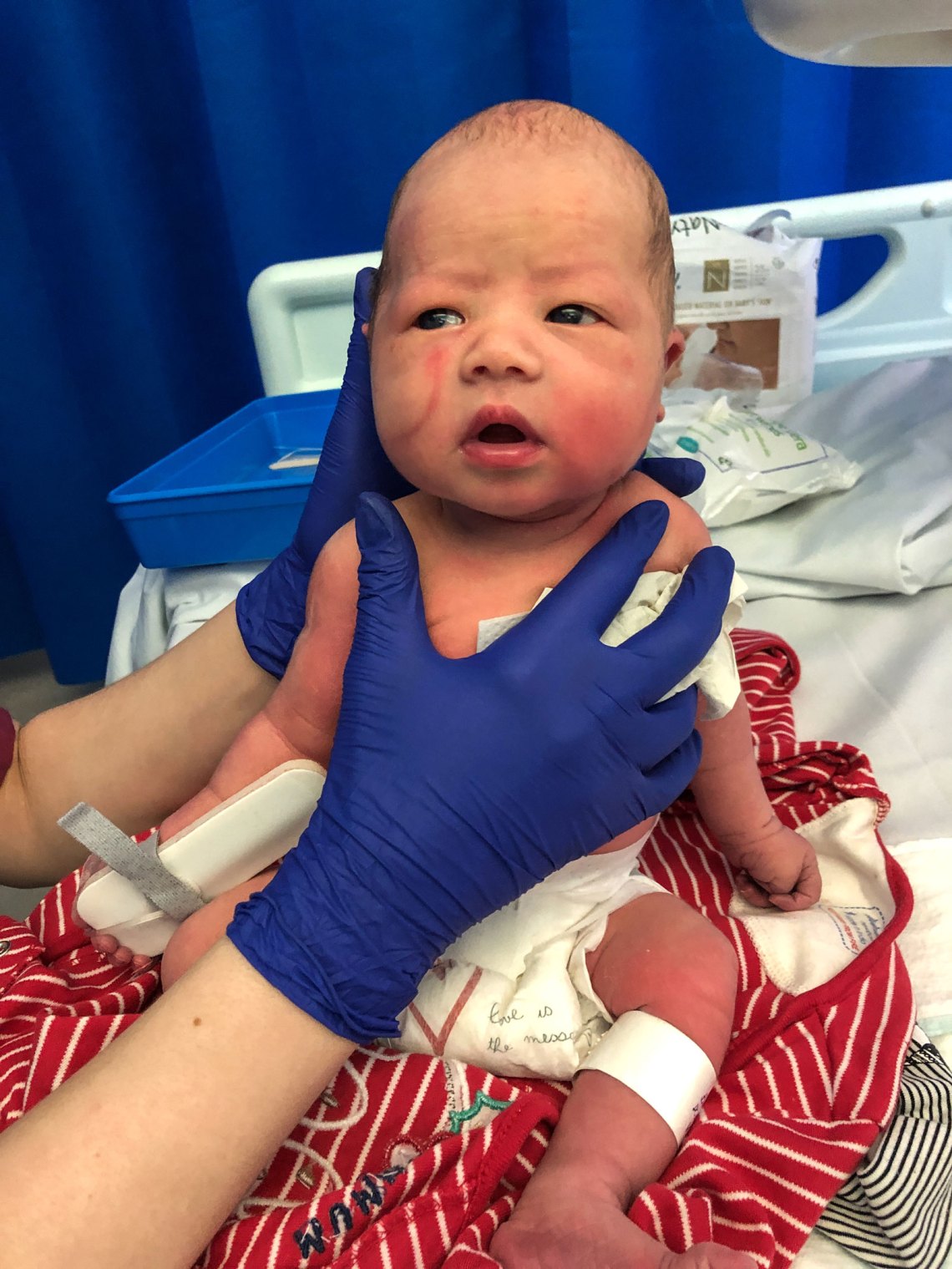King’s College Hospital in South London lies like an ancient dam halfway up Denmark Hill, its wards and stations housed in glass atriums and concrete blocks. Behind it are islands of tony neighborhoods and forested parks, while below is a stream of cut-rate nail salons, supermarkets, and charity shops that flow toward the Thames.
I got to know this neighborhood after arriving in the United Kingdom from China in late February. I had come because my partner, the photographer Sim Chi Yin, was expecting a child and was living nearby. But before I could help out with the last weeks of pregnancy, I wanted to protect her and our unborn child. I knew I must isolate myself, and so went to the countryside to stay with relatives for two weeks. When that was over, I did what I’d been craving to do during the previous seven weeks of lockdown in Beijing and self-quarantine: visit a barber shop and a whisky bar.
Soon after I accomplished these essential tasks in mid-March, the British government finally imposed its own restrictions. And I was back to where I was when I was living in Beijing, walking around my neighborhood and watching the virus change our lives.
It was not coincidental that I orbited the hospital. This was where Chi Yin was due to give birth and we’d visited several times for pre-natal appointments, making it a familiar landmark. It was also one of the prime hospitals for handling coronavirus patients. As the days passed, the wail of sirens to and from the hospital came ever more frequently. I would walk by and wonder, little able to imagine the traumas unfolding inside.
*
The virus’s speed wasn’t surprising. When I arrived at London’s Heathrow airport on February 29, I had been shocked at this country’s cavalier attitude toward public health. As I’ve written earlier, even though my plane was coming from the virus’s country of origin, the other passengers and I simply passed through immigration control, got our bags, and vanished into the city. There was no temperature check and not even a contact card in case one of us later came down with the illness. Britain, so obsessed with Brexit, was unable to focus on the outside world.
It doesn’t take hindsight to judge this as madness. At the time, it was clear that the coronavirus was a tsunami that had already flattened other regions and was cresting toward these islands. And yet, the government did not order people to take cover. Instead, it allowed them to dawdle at the beaches, sure that what had happened in some far-off country could never happen here—that plucky British common sense would make it a minor inconvenience. Lockdowns were for Orientals and Continentals, not a people that had just cut ties with the European Union and was looking for trading opportunities abroad. Science was replaced by magical thinking; all that mattered was the right attitude.
This delusional response was mirrored in other wealthy countries—the United States and Italy come immediately to mind—that over the past decades have also begun to descend into dysfunctionality. The reasons for that decay are complex, but at heart must be the political crisis caused by years of economic stagnation and neglect. One effect has been to propel charlatans or politically weakened leaders to power, with disastrous consequences when a crisis occurs that demands serious leadership. For Britain, the result has been catastrophic. At the time of writing, it had more than 39,000 deaths, trailing only the United States for tops in the world.
This crisis began seeping into our little world when we took a course on infant care after I left my self-quarantine. Even though the UK lockdown hadn’t yet been put in place, London was already emptying. Yet the meeting went ahead as planned, with no social distancing because the government hadn’t ordered it. A dozen of us, including six pregnant women, sat in a circle and discussed fantasies from another era: home births, natural pain relief, and birth partners. It was like planning an afternoon hike when we were about to ascend Everest without oxygen.
In the days that followed, I raced through more bucket-list items: I went swimming at the local sports center in Peckham, visited a research library, and stocked up on cut-rate diapers at the Aldi discount store. By the time I did the latter, on March 17, it was clear that even the most low-information Londoners were aware that a lockdown was inevitable: the store was packed with people buying bulk sodas, junk food, and toilet paper.
Amazingly, the UK government would wait another six days to act. Don’t forget that the World Health Organization had declared the virus an “international health emergency” on January 30, and in early February the government had flown some Britons out of the virus’s epicenter of Wuhan. In New York, Mayor Bill de Blasio had declared a state of emergency on March 12. But here we were in Britain, more than a week later, and the government’s main message was still to wash one’s hands thoroughly.
Advertisement
These events didn’t come across as being so obviously incompetent as the US response. What I think sets the UK apart is that officials here are more polished at talking nonsense. Hence the health secretary said in March that “we’ll take the right action at the right time,” which sounds logical enough, but really justified a series of one-eighties—because what wasn’t right last week was now right, or vice versa. The government thus went from denying that the virus was dangerous to adopting a strategy of “herd immunity,” and then doing an about-face when it turned out that would cost half a million lives—by which time the prime minister had to warn Britons it was now inevitable that loved ones would die.
It’s easy to blame all of this on Boris Johnson. Writing in these pages last year, Fintan O’Toole adeptly analyzed the prime minister’s compulsive mendacity. Johnson’s performance over the past two months has been par for the course: he missed crucial crisis meetings, boasted of shaking hands with coronavirus patients, and then ended up in intensive care himself when he contracted the virus. He’s now back at work, but is his usual slovenly, unprepared self, unable to answer why so many people have died in nursing homes, why government testing targets are missed more than met, what the devil is meant by the latest slogan, “stay alert,” and why it was perfectly fine for his top adviser apparently to flout the stay-at-home orders everyone else had to obey.
But British society also bears part of the blame. One element is the soppy sentimentality that Britons have toward the National Health Service. The NHS might have a quasi-church-like status in Britain, perhaps because almost all other national institutions—the royalty, the military, the railways—are diminished thanks to self-inflicted wounds or budget cuts. But the health service is not really that remarkable a medical service in terms of outcomes. By international standards, the UK pays an average amount of money for average services, according to third-party studies of its efficacy. It only looks good compared to the United States’ wildly expensive and miserable medical system, which, in this America-fixated country, is enough to give the NHS a near-mythic status.
Every Thursday night, for example, people go outside to clap and shout out their thanks to NHS workers. Of course, no one can object to this—as we would soon experience, the medical workers are remarkable and deserve our profound thanks. And yet, when you strip away the cant, this display is just another five-minute expression of solidarity, similar to ones found all over the world amid this pandemic. Regardless of how many cute rainbows and “Thank You, NHS” signs that children draw (presumably at their parents’ or teachers’ behest, for the most part), the reality is that this show of gratitude comes from the same public that successively voted in governments that left NHS employees with shockingly little protective equipment and staffed by the very foreigners that Brexit adherents would like to expel.
Another, broader failing is a widespread lack of social responsibility. In my ever-longer walks through the city, I found that few people paid attention to the government’s request to keep two meters apart from others. In the leafier, more genteel neighborhoods north of the hospital, people would jump theatrically to the other side of the road when a person approached. But even in these areas, the parks were full of people lounging about, joggers brushing past pedestrians, and cyclists weaving in and out. And in the poorer areas south of the hospital, there was no effort: people slipped past each other on the high street, youths played soccer matches, and a group of drunks hung out, smoking and sharing bottles.
Most striking was the almost complete absence of law enforcement. I only saw evidence of state presence in the form of ambulances and the occasional police car racing to an emergency. But bobbies on the beat? That was from another era. A friend suggested that this was because Britons aren’t used to government’s enforcing standards of public behavior, which is fine if people have the social discipline to carry out that task themselves, but many of those I encountered obviously did not.
Advertisement
In some ways, the government seemed intimidated about having to face society. Johnson harped again and again on the need to go into lockdown as late as possible because British people wouldn’t be able to stand losing their “ancient freedoms”—in other words, that citizens couldn’t hack the rules and the government wouldn’t enforce them. So it was no surprise that no sooner had the worst wave of deaths peaked in early May than the government loosened restrictions, even though hundreds of Britons were still dying each day.
*
As for us and our natal drama, we sailed into April hopeful that things would still work out smoothly. Chi Yin was healthy and all her checkups were regular: the baby was positioned perfectly, she was exercising, and we had written up a careful birth plan. Of course, all births are highly unpredictable, but this seemed to be going by the book.
A sense of unease, however, continued to creep in. In a series of letters to our unborn son, Chi Yin noted that our borough had the second-highest number of cases in the country. Then, two friends who work in non-emergency medical services—one as a plastic surgeon, the other as a hand therapist—were suddenly sent to the coronavirus ward. Midwives, too, were called to the front lines. Routine prenatal checks and services were suddenly cut, or reduced to phone calls.
In some ways, this redeployment was amazing: the NHS really did live up to its name as a national health service. It was like a ship whose crew could be deployed as the captain saw fit. In this case, that meant emptying hospitals of non-critical patients and assigning medical personnel in ways unimaginable in other countries. Unlike New York City’s elite hospitals, some of which initially refused to test patients, there would be none of that here. Everyone was called to battle stations and expected to do their duty.
The problem was that they weren’t serving in Nelson’s navy. The NHS, for example, has one of the lowest ratios of emergency-room beds per capita in the developed world. This was a battle that in the best of times would have required early decisive action, but this advantage had already been frittered away. The battle was lost before it began.
All of these ruminations ended on April 7 at 2 AM, when Chi Yin started bleeding. We called the hospital maternity ward for help and were told to go to come straight in. In hindsight, this was merely an early sign of labor and we should have been sent home, but the doctor urged us to let them induce her.
Early April was the peak of the virus’s attack in the United Kingdom, with five to six thousand new cases and up to a thousand deaths a day. All home-births had been canceled to save on midwives and ambulances. Part of the maternity ward was now housing Covid-19 patients. Beds were scarce. But there was a lull this morning, the doctor said. It was now or never.
This ended up being a disastrous mistake. Earlier rules had already reduced the number of birth partners permitted from two to one, meaning we couldn’t bring our doula. But what we didn’t understand was that the hospital now wouldn’t allow me to accompany Chi Yin either—not until she was in what is known as “established labor,” in other words, when the cervix had dilated to four centimeters.
So she was assigned a bed and told to hurry up and dilate—and was left largely on her own to do so. Under normal circumstances, this phase would have happened at home. She could have spent this time on an exercise ball, or taking a walk through the park. Or at least I would have been there to help her do things—move around, get food, or have pain relief. Instead, she was alone.
After eight hours of contractions, she finally dilated enough to qualify as being in established labor. But there were no midwives available to carry out the birth so she couldn’t leave the ward for a birthing room. More delays. More poking and measuring. It was now mid-afternoon. Finally, a room and a midwife were assigned. And I was allowed in.
Chi Yin’s appearance shocked me. She hadn’t eaten or rested in nearly twenty-four hours, was dehydrated and emotionally defeated. In addition, the delayed stay on the ward had resulted in her developing sepsis, a life-threatening condition brought on by infection. She was given antibiotics. The midwives—they work in shifts so we saw several; all of them were superb—believed it was because of the long hospitalization and endless inspections.
The finale was brutal. After another sixteen hours of labor, she couldn’t make the final push. The baby’s heart rate was dropping, and so an emergency team came in and pulled him out with forceps. For reasons we don’t fully understand, Chi Yin lost more than three pints of blood (somewhere between a third and a quarter of her body’s supply). As she later wrote in a post for National Geographic, there was no happy family snap of Baby Lucas on mom’s chest shortly after the birth. Instead, I have a photo of Chi Yin looking deathly white, while, out of frame, a doctor is stitching her up.
That wasn’t the end of the ordeal. Because of the birth complications, she and Lucas had to spend another forty-eight hours on a noisy postnatal ward. Again, Covid-19 rules meant there were no visitors, so I was barred from seeing them. When I finally did get to, she could barely walk and Lucas was easily startled after all the disturbance and stress.
Even back at home, Chi Yin had lost so much blood that she couldn’t produce milk for a week and still struggles now to feed Lucas. For weeks, she had nightmares and still can’t walk comfortably. Lucas still has a hard time looking to his right—the forceps initially left a huge welt over his right eye. That has now gone, but a faint outline remains, a tiny scar from his brief past.
We still struggle to understand what happened. Childbirth is always risky and births often don’t go according to plan. We also are aware that, in another era, both Chi Yin and Lucas might have died. So we are grateful that we are alive and on the mend. And in the end, these memories will fade. Yet the pregnancy had had no complications, and there was no reason for what happened—no breach birth, no illnesses, no addictions, no lack of preparation. The problem stemmed from being caught on the wrong side of a lopsided battle taking place in an over-burdened system. What should have been a magical bringing of new life became a dark time that we’re only slowly exiting.
Compared to the nation’s losses, our traumas are mild. What will stay with us are the acts of kindness, especially by the midwives and friends who brought by food and gifts, or just helped out. In this, our experiences might mirror the feelings other people have about the corona crisis: that we survived but many of our governments failed.



